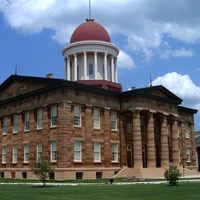
NPS Photo Though Lincoln was a new resident of Springfield, he was not a stranger to the town. Since 1834, Lincoln had represented Sangamon County in the Illinois General Assembly and helped move the capital from Vandalia to Springfield. The prairie city was growing rapidly. A newspaperman wrote in 1839 that Springfield contained "a throng of stores, taverns, and shops . . . and an agreeable assemblage of dwelling houses very neatly painted, most of them white, and situated somewhat retiringly behind tasteful frontyards." For Lincoln, the young lawyer and up-and-coming State legislator, Springfield possessed opportunities which could only enhance his already promising future. Here Lincoln could meet politicians and local leaders from all over the State. One was Stephen A. Douglas, a State senator who would defeat Lincoln in the 1858 election for the U.S. Senate. And here, too, he met Mary Todd. Mary Todd came from a prominent family. She was born in Lexington, Ky., on December 13, 1818, the daughter of Robert Todd, a banker. The Todds were leading members of the community. They had helped found Lexington and Transylvania University, the first college west of the Appalachians. Mary grew up amidst all the comforts which the times and area offered: she went to a private school which only children of the "best families" attended, and slaves waited on her. In October 1839, Mary Todd came to Springfield to live with her sister, Elizabeth, the wife of Ninian Wirt Edwards, son of a former governor of Illinois. Here Mary joined the group of single young men and women who often gathered at the Edwards home. Among the young men were Stephen A. Douglas; Edward C. Baker, a future U.S. representative; James Shields, a future U.S. senator from Illinois, Minnesota, and Missouri; Lyman Trumball, a future U.S. senator from Illinois; and Lincoln. Soon Lincoln and Mary were fast friends. Their relationship waxed and waned as the months passed, but in the fall of 1842, they decided to marry. It was a decision that her sisters found difficult to accept, for Lincoln's background, in their eyes, did not measure up to Mary's. On the morning of November 4, 1842, Lincoln went to the home of Rev. Charles Dresser, the Episcopal minister and told him, "I want to get hitched tonight." Lincoln and Mary wanted to be married in the minister's home because of her family's opposition. But when they learned that she was determined to go through with the wedding, the Edwards insisted that the wedding must take place in their home. That evening Mary Todd and Abraham Lincoln stood before Rev. Charles Dresser and repeated their vows. Their first year together, the Lincolns lived in a hotel boarding house, the Globe Tavern. Here their first child, Robert Todd Lincoln, was born on August 1, 1843. The noisy, crowded conditions in the Globe did not make a homelike environment, so the Lincolns moved and spent the winter in a rented three-room cottage at 214 South Fourth St. The next spring, Lincoln bought Rev. Dresser's home on the corner of Eighth and Jackson Streets for $1,200 cash and a small lot worth $300. They lived on a tight budget. Lincoln himself chopped the wood, carried the water, milked the cow, and did the rest of the chores men did in those days. And to keep the money coming in, Lincoln had to go out and travel the judicial circuit. The Eighth Circuit, in which he practiced, covered 31,073 square kilometers (12,000 square miles) and was sparsely settled with county seats far apart connected by rough roads often in disrepair. Lincoln traveled this circuit on horseback, exposed to the elements, with a volume of the Revised Statutes, copies of Blackstone's Commentaries and Chitty On Pleadings , and an extra shirt and change of underwear in his saddlebags. Lincoln made a name for himself on the circuit, and in 1846 he won election to the U.S. House of Representatives as a Whig. That same year the Lincolns' second son, Edward Baker, was born. |
Last updated: April 10, 2015
